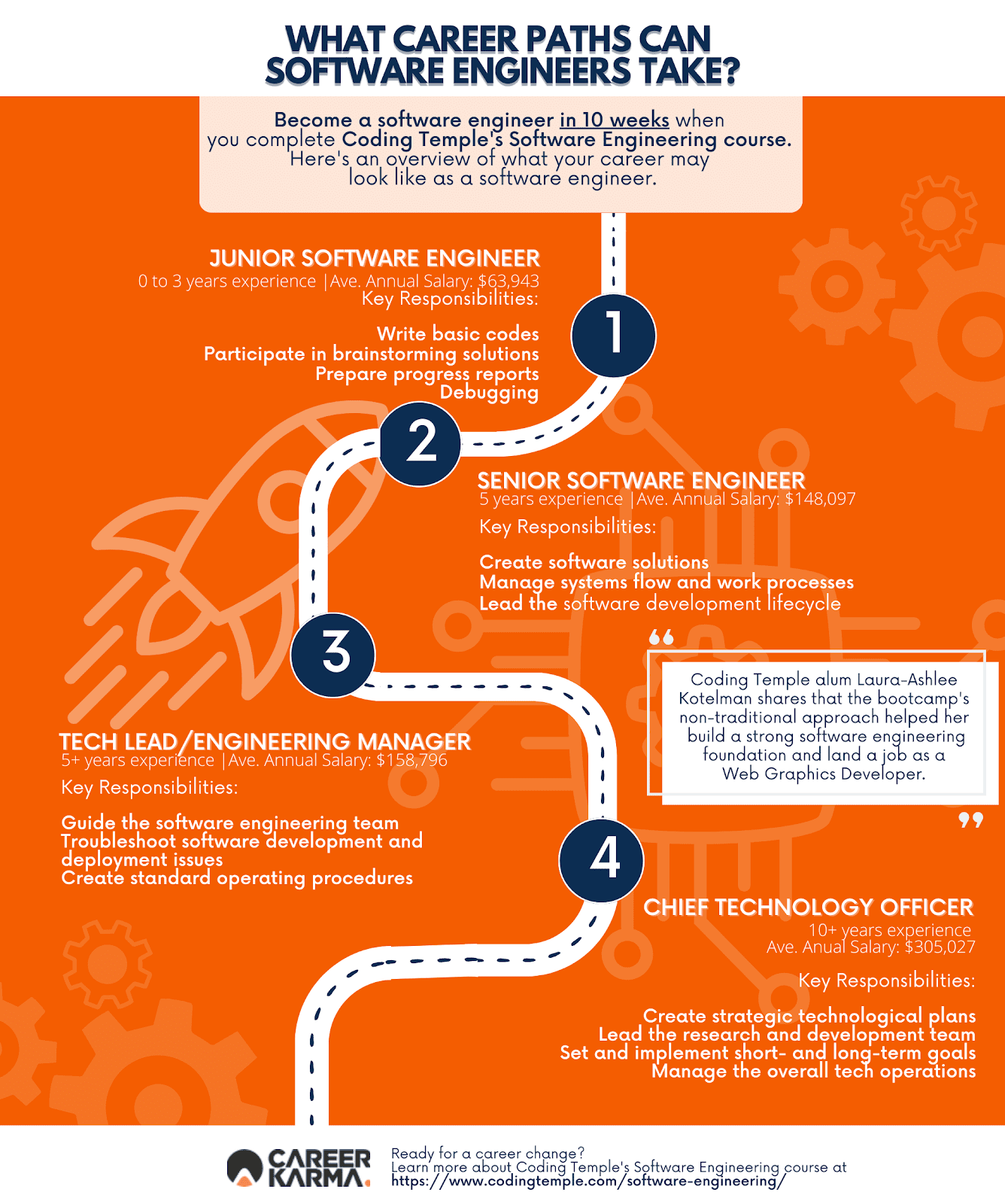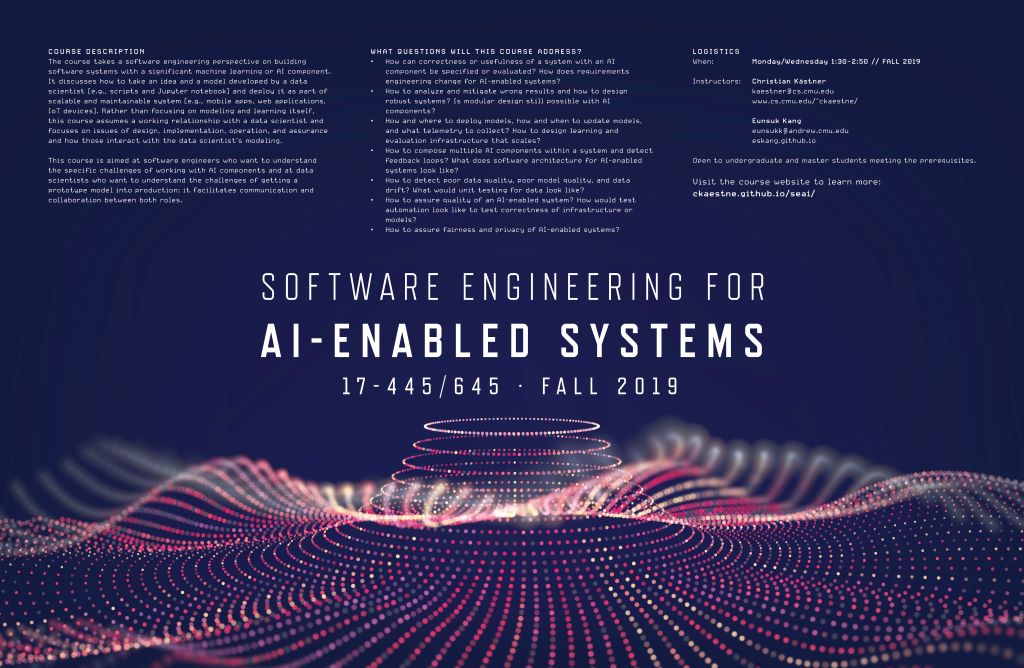All Categories
Featured
Table of Contents
In 2020, the course will certainly be offered both in the Summertime term and in the Autumn semester. The Summertime offering will certainly be a lot more targeted towards trainees with software program engineering experience (e.g., software program design program, commercial experience, or teaching fellowship experience), but will expect no data scientific research background. The Autumn offering will certainly be targeted extra at pupils with some data scientific research experience (e.g., a device discovering course on campus or online), yet will anticipate no software program design background.
See below for certain changes. For scientists, educators, or others thinking about this topic, we share all training course product under an innovative commons license on GitHub () and have just recently published an article explaining the reasoning and the layout of this program: Teaching Software Engineering for AI-Enabled Systems. We would be delighted to see this course or a similar version educated somewhere else.
It will certainly focus mostly on sensible methods that can be made use of currently and will include hands-on technique with modern-day devices and facilities. Office Hours: after each lecture We utilize Canvas for news and conversations.
I will certainly always stick about after course to address concerns and am delighted to relocate to a private network if you request so. The training course material evolves from term to semester. See the program content of the Loss 2019 term to obtain an introduction and have a look at our Understanding Goals.
Of of this is subject to change and will certainly be upgraded as the term proceeds, especially to assist concentrate on asked for topics or assistance knowing. Set up (Initial timetable, conditional) Date Topic Reading Task due Tue, May 19 Intro and Motivation (md, pdf, video) Wed, May 20 Thu, May 21 Artificial Intelligence for Software Program Engineers 1 (md, pdf, video clip) Structure Intelligent Equipments, Ch.
21 & Product: Organizing Google's Datasets Tue, Jul 28 Protection, Adversarial Discovering, and Privacy (md, pdf, video, train) Structure Intelligent Equipments, Ch. 13 & Forecast machines, Ch. 19 Joined, Jul 29 Thu, Jul 30 Security (md, pdf, video clip) Tue, Aug 04 Fostering Interdisciplinary Teams (md, pdf, video clip) Thu, Aug 06 Summary and Evaluation (md, pdf, video clip) Fri, Aug 07 The training course uses Canvas for uploading slides, readings, and video clips, for conversations, for quizzes, statements, and additional files; Gradescope (linked from Canvas) is used for research submissions and grading; GitHub is utilized to collaborate group job.
Machine Learning Engineering Course For Software Engineers Fundamentals Explained
We will have an open-book midterm during a lecture timeslot and project/homework discussions over Zoom. We promise to never use any kind of proctoring or attention-checking devices. Online participation and activated cams are there to produce a far better and even more inclusive learning experience, not to spy on you or compel you to focus.
Keep in mind that we do rule out simple passive visibility as participation, yet only active engagement. While teaching remotely, we'll offer a 10% perk on the involvement grade for keeping a camera turned on throughout class. We will certainly provide comments at mid-semester so you can sign in on how you're doing.

Team effort is an important part of this program. Numerous jobs and a final project are done in groups of 3-5 trainees. Teams will certainly be appointed by the instructor and remain with each other for numerous projects and a last project. A team plan uploaded on Canvas applies and defines duties and groups and just how to deal with conflicts and inequalities.
We make announcements via Canvas and use Canvas additionally for discussions, consisting of clearing up research assignments and other interactions. We will be utilizing Goeff Hulten's "Structure Intelligent Systems: An Overview to Equipment Learning Design" (ISBN: 1484234316) throughout much of the course.
Facts About Zuzoovn/machine-learning-for-software-engineers Uncovered

In addition, we will provide added supplemental analyses, including blog site posts and scholastic documents, throughout the semester. Examination will be based on the following distribution: 35% specific tasks, 20% midterm, 30% team project, 10% engagement, 5% reading quizzes. This is a 12-unit program, and it is our intention to manage it so that you spend near to 12 hours a week on the course, on average.
Notification that some research is carried out in groups, so please represent the expenses and decreased time flexibility that features groupwork. Please feel totally free to provide the program staff comments on just how much time the training course is considering you. Late work in private tasks will be approved with a 10% charge each day, for approximately 3 days.
Please communicate also with your group regarding potential timing problems. Defining tradeoffs among decisions and communication with stakeholders from other backgrounds are vital facets of this class. Numerous homework jobs have a part that calls for going over issues in written type or reflecting regarding experiences. To exercise creating abilities, the Global Communications Center (GCC) offers individually assistance for pupils, together with workshops.
The common plans apply, specifically the University Policy on Academic Integrity. Several projects will be performed in teams. We expect that team participants team up with one an additional, yet that groups function independently from one an additional, not trading results with various other teams. Within teams, we expect that you are honest concerning your contribution to the group's job.
The Main Principles Of Fundamentals Of Machine Learning For Software Engineers
You might not take a look at another student's option, even if you have completed your own, nor might you knowingly provide your option to another student or leave your option where another student can see it. Below are some examples of habits that are inappropriate: Copying or retyping, or describing, data or components of files (such as resource code, written text, or device tests) from an additional individual or resource (whether in last or draft kind, regardless of the consents established on the associated documents) while creating your own.
Composing, using, or submitting a program that tries to change or erase grading info or otherwise compromise safety of course sources. Lying to course staff.
Be careful the privacy settings on your open source accounts! Mentoring others step-by-step without them comprehending your assistance. If any of your work contains any type of statement that was not composed by you, you need to place it in quotes and point out the source. If you are paraphrasing an idea you review in other places, you have to recognize the resource.
If there is any concern about whether the product is permitted, you must get approval ahead of time. We will certainly be utilizing automated systems to find software application plagiarism. It is not taken into consideration cheating to make clear obscure points in the assignments, talks, lecture notes; to offer help or get aid being used the computer systems, compilers, debuggers, profilers, or various other facilities; or to discuss concepts at an extremely high level, without describing or generating code.
The minimum fine for disloyalty (consisting of plagiarism) will be a no grade for the whole task. Cheating events will certainly also be reported via University networks, with possible extra disciplinary action (see the above-linked University Policy on Academic Integrity).

We will certainly deal with you to guarantee that holiday accommodations are offered as appropriate. If you think that you may have a disability and would gain from holiday accommodations but are not yet signed up with the Office of Handicap Resources, we encourage you to contact them at [email protected]!.?.!. Please deal with on your own.
The Single Strategy To Use For Machine Learning In A Nutshell For Software Engineers
Requesting support faster instead of later is often valuable. If you or anyone you recognize experiences any type of scholastic stress, challenging life occasions, or sensations like anxiety or anxiety, we strongly urge you to seek support. Therapy and Psychological Providers (CaPS) is below to aid: call 412-268-2922 and visit their site at http://www.cmu.edu/counseling/.
You most likely understand Santiago from his Twitter. On Twitter, every day, he shares a whole lot of practical aspects of equipment knowing. Many thanks, Santiago, for joining us today. Welcome. (2:39) Santiago: Thanks for welcoming me. (3:16) Alexey: Prior to we go right into our main subject of relocating from software program engineering to artificial intelligence, possibly we can start with your history.
I started as a software application developer. I went to college, obtained a computer system science degree, and I started constructing software. I think it was 2015 when I chose to go for a Master's in computer system science. At that time, I had no concept concerning maker understanding. I didn't have any type of rate of interest in it.
Rumored Buzz on I Want To Become A Machine Learning Engineer With 0 ...
I know you've been using the term "transitioning from software design to artificial intelligence". I like the term "including in my capability the artificial intelligence skills" a lot more since I assume if you're a software engineer, you are already providing a great deal of value. By incorporating artificial intelligence currently, you're boosting the effect that you can have on the sector.
Latest Posts
The Best Software Engineer Interview Prep Strategy For Faang
Google Vs. Facebook Software Engineering Interviews – Key Differences
The Best Machine Learning Interview Prep Courses For 2025